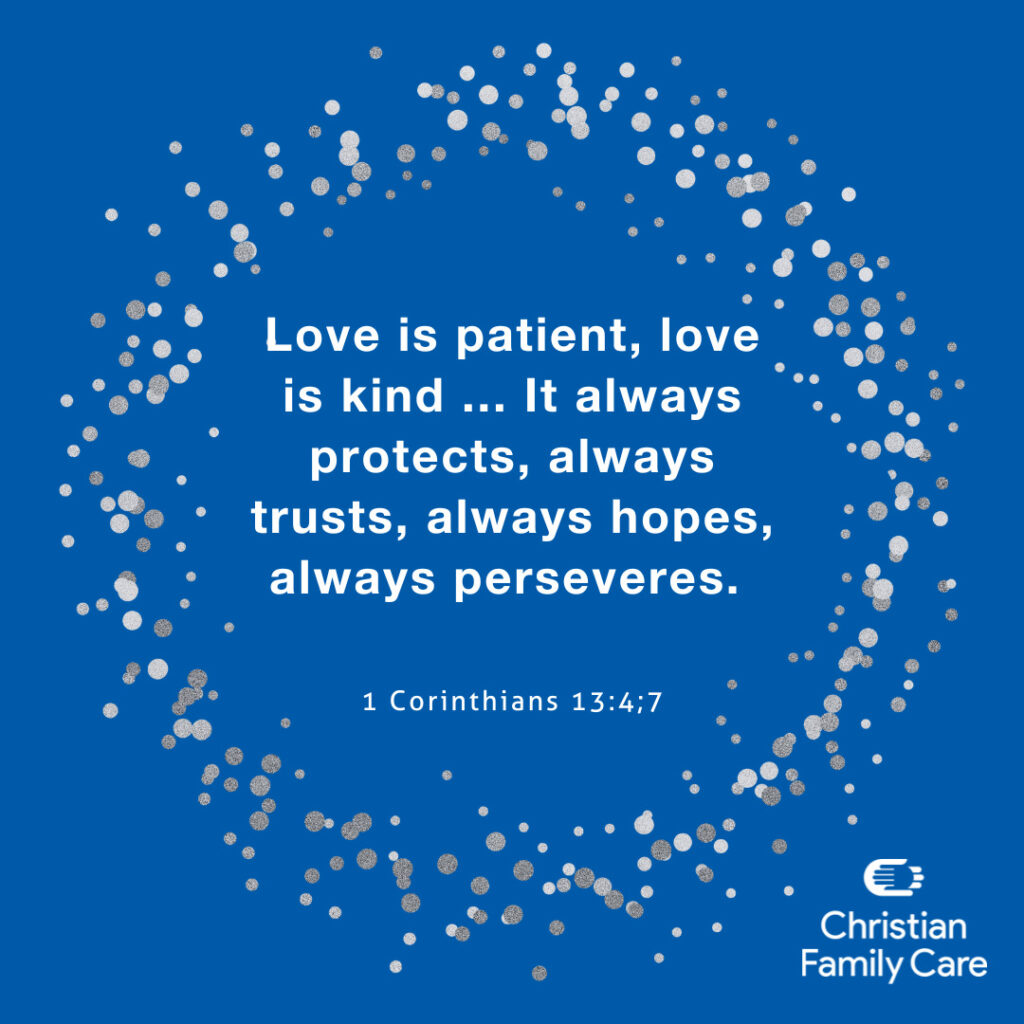Agape love: what does the Bible say about it?
By Sarah Earles, MS, LPC, NCC | April 09, 2023

Christians see the Bible as a guidebook and source of wisdom for life. While it does not always give specific interventions for life, it does lay out principles that apply to everyday life. So, what does the Bible say about love, especially love as a foster and/or adoptive parent?
First Corinthians 13 is considered the preeminent “love” chapter in the New Testament. Many couples read this chapter at their weddings. Counselors and pastors quote 1 Corinthians 13 when discussing marriage. These are not wrong uses of the text. The text itself, however, has broader application. The Apostle Paul writes about agape love, what Commentator David Guzik (2022) calls “a sacrificial, giving, absorbing kind of love.” Guzik goes on to write that “the word has little to do with emotion; it has much to do with self-denial for the sake of another.” Is this not the love of a parent, especially a foster or adoptive parent who takes on the hard and beautiful life of loving a child who is not biologically their own? Yes!
If 1 Corinthians love applies to foster and adoptive parents, then, how does it apply? What does it look like within the special context of foster care and adoption? First of all, it looks more like action. [“If I give all I possess to the poor and give over my body to hardship that I may boast, but do not have love, I gain nothing.” New International Version, 2011, 1 Cor 13:3)]. Serving at-risk children is one thing. Doing it with love is another thing.
“Love is patient” (1 Cor 13:4). Kids from hard places need lots of patience and long suffering. Can parents give them the benefit of the doubt when they have big behaviors, and keep loving them?
Love “is not proud.” Can parents love their kids because of Jesus’ love for them, rather than for accolades (Foster VA, n.d.)? Can parents love their children’s biological parents, even if those parents are themselves struggling (Still Orphans, 2017)? This requires great humility.
Love “always protects, always trusts, always hopes, always perseveres” (1 Cor 13:7). Safety is key for children from hard places. “Even in moments of struggle and adversity, the parents must hold onto hope and persevere with their child” (Foster VA). This allows the children room for growth. It models the love of God.
In conclusion: of faith, hope, and love, “the greatest of these is love” (1 Cor 13:13). Love is hard when kids come from hard places. Foster and adoptive parent love has great potential to change lives for children, and for the watching world.
Lecturas recomendadas

Christians see the Bible as a guidebook and source of wisdom for life. While it does not always give specific interventions for life, it does lay out principles that apply to everyday life. So, what does the Bible say about love, especially love as a foster and/or adoptive parent?
First Corinthians 13 is considered the preeminent “love” chapter in the New Testament. Many couples read this chapter at their weddings. Counselors and pastors quote 1 Corinthians 13 when discussing marriage. These are not wrong uses of the text. The text itself, however, has broader application. The Apostle Paul writes about agape love, what Commentator David Guzik (2022) calls “a sacrificial, giving, absorbing kind of love.” Guzik goes on to write that “the word has little to do with emotion; it has much to do with self-denial for the sake of another.” Is this not the love of a parent, especially a foster or adoptive parent who takes on the hard and beautiful life of loving a child who is not biologically their own? Yes!
If 1 Corinthians love applies to foster and adoptive parents, then, how does it apply? What does it look like within the special context of foster care and adoption? First of all, it looks more like action. [“If I give all I possess to the poor and give over my body to hardship that I may boast, but do not have love, I gain nothing.” New International Version, 2011, 1 Cor 13:3)]. Serving at-risk children is one thing. Doing it with love is another thing.
“Love is patient” (1 Cor 13:4). Kids from hard places need lots of patience and long suffering. Can parents give them the benefit of the doubt when they have big behaviors, and keep loving them?
Love “is not proud.” Can parents love their kids because of Jesus’ love for them, rather than for accolades (Foster VA, n.d.)? Can parents love their children’s biological parents, even if those parents are themselves struggling (Still Orphans, 2017)? This requires great humility.
Love “always protects, always trusts, always hopes, always perseveres” (1 Cor 13:7). Safety is key for children from hard places. “Even in moments of struggle and adversity, the parents must hold onto hope and persevere with their child” (Foster VA). This allows the children room for growth. It models the love of God.
In conclusion: of faith, hope, and love, “the greatest of these is love” (1 Cor 13:13). Love is hard when kids come from hard places. Foster and adoptive parent love has great potential to change lives for children, and for the watching world.
Lecturas recomendadas
References
Guzik, D. (2022, August). Study guide for 1 Corinthians 13. Blue Letter Bible.
Foster VA. (n.d.). Building a loving foster family: 1st Corinthians 13:4-13.
New International Version. (2011). BibleGateway.com.
Still Orphans. (2017, October 17). 1 Corinthians 13 love for bio parents.
References
Guzik, D. (2022, August). Study guide for 1 Corinthians 13. Blue Letter Bible.
Foster VA. (n.d.). Building a loving foster family: 1st Corinthians 13:4-13.
New International Version. (2011). BibleGateway.com.
Still Orphans. (2017, October 17). 1 Corinthians 13 love for bio parents.




